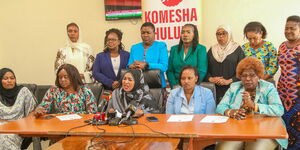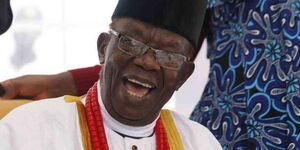Renowned Senior Counsel Ahmednasir Abdullahi could find himself in trouble with the law after Chief Registrar of the Judiciary Winfridah Mokaya escalated the feud between the lawyer and the Judiciary into a call for investigations.
In a letter dated May 20, the Chief Registrar requested the Office of the Director of Public Prosecutions (ODPP) to investigate Ahmednasir after the lawyer's series of damaging allegations against the Judiciary.
Among the allegations made by the senior counsel was a sensational claim that a Supreme Court judge accepted a multi-million shilling bribe to influence a ruling in the Court of Appeal.
In his original post, Ahmednasir claimed the judge had received Ksh4 million from a lawyer and his client to swing a decision their way at the appellate level.
Ahmednasir further claimed that the case took a twist when the client in question still lost the case, prompting the judge to allegedly refund Ksh3 million of the alleged bribe, with the remaining Ksh1 million expected to be settled within the week.
The Judiciary has since taken these claims seriously, with the Chief Registrar of the Judiciary writing to the Director of Public Prosecutions, Renson Ingonga, calling for the investigations and probable apprehension of the vocal lawyer.
“This pattern of conduct amounts to a crime under the laws of Kenya,” the Judiciary said in the letter.
“We are deeply concerned that if this continues, it will erode public confidence in the Judiciary and undermine the rule of law.”
In characteristic fashion, Ahmednasir laughed off the Chief Registrar of the Judiciary's letter to the ODPP, accusing Mokaya of attempting a cover-up. The lawyer also questioned the authenticity of the letter by alluding to the fact that it did not have Mokaya's signature.
“Instead of investigating the matter and apprehending the Supreme Court Judge who took a bribe of Ksh6 million, she has the audacity to ask for my apprehension," he claimed on X, formerly Twitter.
He added, “It is the incompetence and graft leadership of the Judiciary that erodes public confidence… not cries for a graft-free judiciary.”
The Judiciary has come under scrutiny in recent months, with Chief Justice Martha Koome in particular getting put to the task of restoring public confidence in one of the most crucial arms of government.
In April, Koome revealed the formation of court integrity committees across all court stations to work as inclusive platforms for judges, judicial officers, advocates, EACC representatives, and other stakeholders to share concerns and address unethical behaviour.












